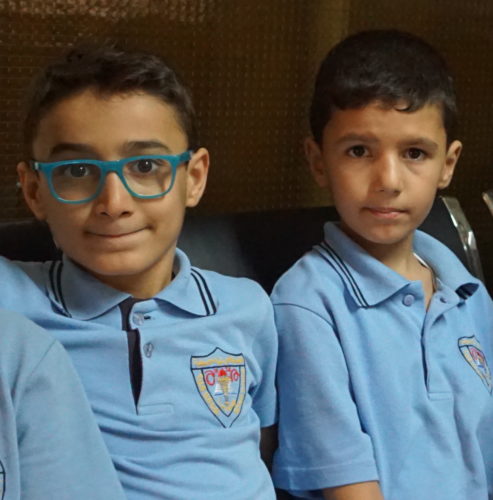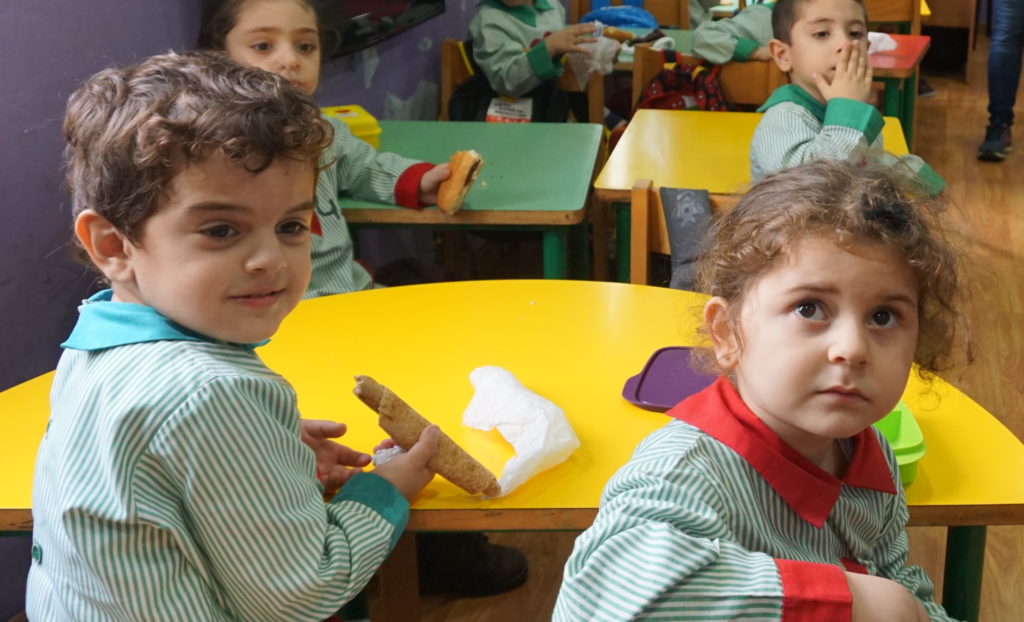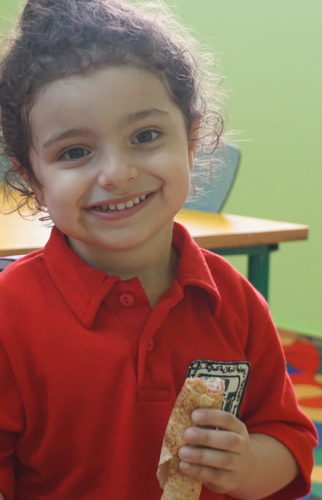Lebanon’s political climate has long been riddled with conflict, which is often further stirred by external factors. Thankfully, however, our affiliated projects the Armenian Evangelical Schools (AES), a group of affordable private schools, offer a well-rounded education to children living in poverty and suffering from political turmoil.
Compared to public schools in Lebanon, however, the AES offer a much higher quality education. Children are provided with more educational tools and resources than the alternative public schools.
Children Incorporated’s partnership with the AES spans decades. Over the years, we have been able to support thousands of children through our sponsorship program.
About Lebanon
Lebanon is located on the eastern coast of the Mediterranean Sea, bordering Israel to the south and Syria to the east and north. This country of six million people acknowledges eighteen religious groups, the largest being the Shiites and Sunnites; there is also a large Christian population in the country.
Up to the end of World War I, Lebanon was part of the Ottoman Empire. In 1920, the League of Nations issued France a mandate over Syria and Lebanon. 23 years later, Lebanon gained its independence.
Current-day conflict
Since 2006, Lebanon has been politically divided into two almost equally-strong camps, whose conflict has prevented the political institutions in the country from functioning. The internal struggle between the two groups is mostly based on social and economic clashes of interest, linked with religious differences.
Other factors also play a huge role in the strife that exists in Lebanon. Internal disagreements over the conflict in neighboring Syria play a part, as well as foreign countries’ involvement and interests in the Syrian War. Both internal and external arguments on how to handle the crisis in Syria only worsen the current situation in Lebanon. Today, more than a million Syrian refugees have been registered in the country.
Although Lebanon has been rebuilding itself steadily, the well-being of children has largely been undermined by these geopolitical circumstances. The country still has a long way to go before reaching an ideal situation, where the protection of children’s rights is taken into full consideration.
The AES IN ANJAR and Beirut
The AES were established in 1964 by the late Stephen Philibosian, a successful Lebanese-American businessman. The AES run five schools in Beirut and one in the city of Anjar, near Lebanon’s border with Syria. Our donors support children in three of these schools — two in Beirut and one in Anjar. Sponsors provide children with aid to cover monthly school fees. Funds donated also go towards purchasing clothes and shoes, as well as school supplies.
Most of the children supported by the AES are Armenians, but some are Arabs. All have been affected by the political and economic turmoil of Lebanon and its neighboring countries. The children come from families that work in low-paying or minimum wage jobs.
Children Incorporated provides is truly valuable, and we would love to see more students at the AES enrolled in our program. Currently, our sponsorship program supports only ten percent of the total student body.
The AES are all private schools, so monthly fees are required for attendance. Compared to public schools in Lebanon, however, the AES offer a much higher quality education. Children are provided with more educational tools and resources than the alternative public schools. Public schools are also overcrowded; so parents in Lebanon do whatever it takes to send their children to the AES, which have a higher academic standard.
Visiting the schools
While visiting two AES schools in Beirut, our Director of International Programs, Luis Bourdet, noticed that since his last visit many years ago, the schools have improved greatly.
“The infrastructure has been updated, and new and more efficient educational programs have been established to improve opportunities for the children,” he said.

Students within the AES are required to study Armenian, Arabic, English, and French.
During Luis’ last visit there more than five years ago, the AES were divided into elementary, middle, and high schools. This meant that children were moving to different buildings as they moved up in school. Now, all of the AES offer classes up to high school level in the same building. This keeps students in the same location for a longer time, providing them with more stability, and improving their academic experience.
According to Luis, students within the AES are required to study Armenian, Arabic, English, and French, along with the core educational subjects required by the local government.
“Before, English was not a core course; but it is emphasized now, as the international importance of the language has increased in Lebanon. So students are able to communicate in the English language now,” Luis stated.
“It was great to see many of the students practicing their English skills, asking questions about the United States, and our programs in general.”
On to higher education
Luis also noticed that overall academic core courses at the AES have improved. The labs are better equipped, and teachers are better trained. These improvements prepare students more effectively for higher education, which most students aim to achieve — and they succeed. The AES have a graduation and higher education enrollment rate higher than ninety percent, which is very high for Lebanon in general.
Children Incorporated provides is truly valuable, and we would love to see more students at the AES enrolled in our program. Currently, our sponsorship program supports only ten percent of the total student body. Luis knows that many more of the children at AES could use the help of supportive sponsors.
***
HOW DO I SPONSOR A CHILD IN LEBANON?
You can sponsor a child in Lebanon in one of three ways: call our office at 1-800-538-5381 and speak with one of our staff members; email us at sponsorship@children-inc.org; or go online to our sponsorship portal, create an account, and search for a child in Lebanon that is available for sponsorship.


